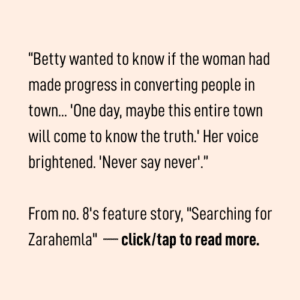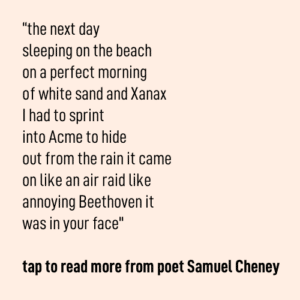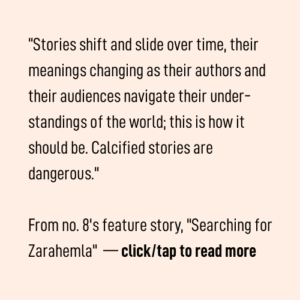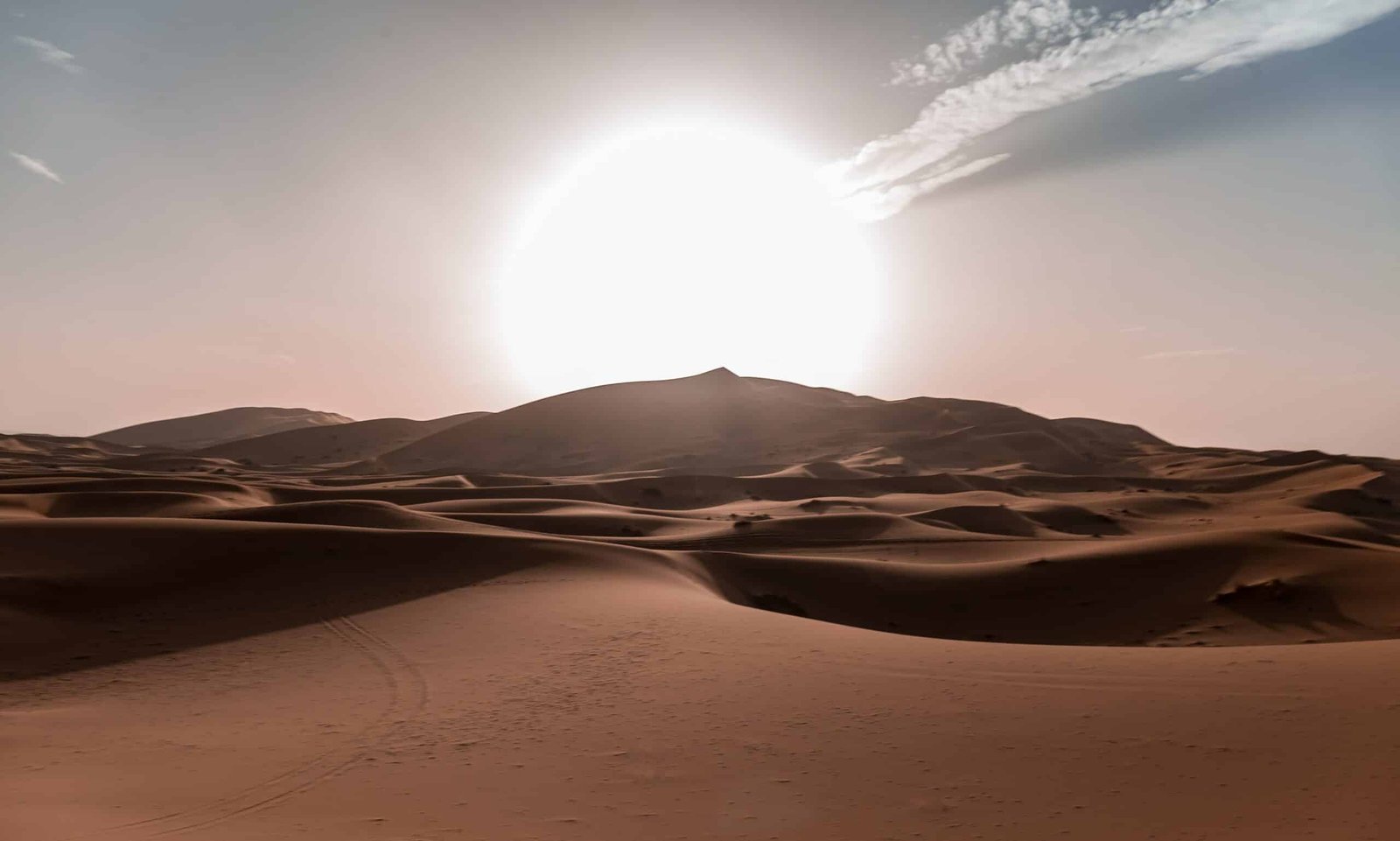Brittany Romanello
no. 8, The Road Trip Issue
Autumn 2022
My dad told me once that the moment he held me in his arms, still fresh and bloody and screaming, he felt the strongest impression from the Holy Spirit come to him: If she chose to be good, this baby girl would be very good, and if she decided otherwise, there would be little he could do to stop her.
For better or for worse, his impression proved true.
* * *
Although I remember the incident clearly, I couldn’t tell you if it was a dream, a nightmare, or a vision. Whatever it was, it felt like a once-in-a-lifetime message, like Ebenezer Scrooge’s experience in A Christmas Carol. Whatever it was, it changed me.

One winter night in late 2016, I cried myself to sleep. It was almost Christmas and what would have been my third marriage anniversary had passed. I’d spend the holidays unexpectedly single, without the extended family I’d grown to rely on. I looked outside at the neighborhood lights and felt my grief spreading into my ribcage to suffocate me slowly. I’d escaped an abusive marriage in May, divorced in July, moved multiple times, lost my job and its financial security, and failed the GRE. Grad school had felt like a chance at a new beginning, but that didn’t seem likely now.
I was also going through a faith transition. I didn’t call it that at the time; I just knew that the Mormon ideal I’d pictured for myself, what I had been working for my entire life, wasn’t working anymore. My failed marriage taught me that I never slowed down and asked myself what I wanted or whom I felt interested in becoming, or let myself dream of anything more than an idyllic, Anglocentric image of married Mormon motherhood. That is the danger of giving impressionable, obedient minds one set of ideas and an answer for everything: When those ideals don’t work out, there’s no backup plan. How in the hell did I get here, the place I was always warned about? Never say never, I guess.
So, that night, I was crying so hard that my tears burned my face, my grief crushed my ribcage, and I felt a boiling in my blood. The last thing I remember was hoping I would fall asleep and not wake up. With my last conscious moment, I melted into the pillow and prayed for answers.
I awoke lying on my back, facing blinding sunshine, in a narrow, white-sanded wilderness — a “No Man’s Land” dreamscape. No Man’s Land is typically a tiny strip or patch of land between two nations that’s neither there nor here. It is a marginalized space that no one is supposed to visit, own, or control, yet geopolitical forces still act upon it. This space was the quietest I’ve ever experienced in dreams or consciousness; I could not even hear the wind.
Gathering my bearings, I faced the nothingness. I began to walk this little strip of land, confused, thirsty, and silent. After an immeasurable amount of time, I felt a hand on my shoulder and a soft, calming voice that sent chills into my dream-spine: “You don’t have to keep walking alone. I’m here.” It was Mother. The Heavenly Mother Mormons believe in but cannot learn about because male church leaders always said she was “too sacred” to be discussed. (The Heavenly Father, like many mortal men I’ve met, seemed to equate protecting women with erasing them.) But there She was, walking with me. I cannot remember Her face, but I remember Her voice and all Her advice, one piece of which was, “you don’t need to choose a side. God exists in this margin of space, too. There’re many of us here.” Our conversation felt hours long.

Then I saw the end of No Man’s Land ahead and a robust figure waiting for me there, too far away to discern. I was about to ask Mother, “who is that?” Was it Jesus? Was it God? Was it a friend? I turned to her, but my Mother, who had shown me unimaginable love, kindness, acceptance, and compassion, was gone. Her handprint was still burning into my shoulders, much like the sun in my eyes. Still crying, I awoke.
* * *
It’s not that I didn’t believe in visions. Visions have shaped my entire religious faith and worldview. Not my visions, though: those of men. I was taught my whole life about the prophets, seers, and revelators who led people toward God — Moses of Egypt; Nephi, son of Israel; Joseph Smith, the Restorer. The lesson was that these men lived righteously and received revelations and visions that would and could not lead their followers astray. But I was a woman and not a prophet, so what did Mother’s appearance in my desperate dream mean for me? I had no context to process this. To speak of visions generally is common among Mormons, yet they’re almost forbidden to discuss if they happen to you. To talk of revelation is constant, yet you should doubt it just enough to ensure that your “answers” aren’t devices of Satan.
Then, to claim the authority to act in the name of your revelations and visions is an entirely separate hurdle. Claiming authority is foundational to the Mormon faith, and yet, if the wrong person does it (and many wrong people have), you end up in dangerous waters, Dan Lafferty or Chad Daybell waters. Mormonism doesn’t like to claim its bad apples, but historically, we have a whole orchard.
I didn’t want to start a movement or a church. I didn’t wish for power or position. I just wanted answers, and permission to liberate myself from the ideas and beliefs that no longer served the long-term vision I felt God, whoever They are, had for me. I prayed fervently in the months after Mother visited. What was my purpose now that I had been told the truth about everything I was and faced myself, maybe for the first time? Mother offered an olive branch amid my moral reckoning; I could coexist with my contradictions. I could embrace living in a margin. I could exist in No Man’s Land, and most importantly, I wouldn’t be alone. I could let go of my fears about transitioning away, my fear of not belonging. Fear of not being enough. Fear of my closeted queer self. Fear of the future.
The vision changed all that, but it required me to act. And so, with Mother’s handprint still burned into my shoulder, I marched forward.
* * *
“Okay, but are you still Mormon?”

A new friend asked me this after our workout in the park last week. I paused. I disassociated. I astrally projected into the ether. Why is this question so hard to answer?
I’ve been asked this frequently over the six years since I heeded Mother’s visitation. Despite the bad GRE scores, everything for a Ph.D. program somehow fell into place. At school in Arizona, I had to learn about life and the world outside of Mormonism. I had always been taught in Sunday School, “be in the world, but not of it,” but now I was “of it,” or at least adjacent to it. Beginning at nearly age twenty-eight, I commenced making all the mistakes and learning life lessons others probably got in high school or early adulthood, from ordering my first beer to unpacking all the disturbing history and problematic views I had as the product of a neo-colonizing, exorbitantly wealthy religious institution.
I felt behind. I felt out of place all the time, and as much as I hate admitting it, I still frequently feel this way.
I am grateful many people from my former life stayed by my side through the learning curves. This experience made our love and trust grow. I made lots of new friends, in and outside of Mormonism. I describe my life as extremely blessed, despite the challenges. Many enthusiastic people support me in my academic research, which is still about Mormonism despite my initial efforts to avoid it.
If she chose to be good, this baby girl would be very good, and if she decided otherwise, there would be little he could do to stop her.
“Hey, earth to Bri? Sorry, is that okay to ask? About you being Mormon?” My new friend inquired again, shaking me back into my body.
The moment to answer had arrived. I still felt conflicted. Do I unravel myself from what made me? Did Mormonism even make me what I am? The old question of nature versus nurture inevitably arises. I spent many years trying to run from the Church until I realized that maybe that wasn’t supposed to be my story. Maybe Mormonism wasn’t supposed to leave me entirely. In academia, especially in social science research, we write positionality statements that ask us to address where we come from so we can locate ourselves in our work. My friend’s question and these positionality statements both required me to face an inconvenient truth: Existing with God in Their marginal space means learning to accept constant discomfort and living without many of the answers I used to think I needed. It was never realistic for me, my faith, or my life to follow a binary; however disharmonious it feels, our human contradictions and complexities can and do coexist. There will be mixed opinions, no matter what I do and how thorough or objective my research is. I will likely seem an apologist to people outside of the Church, and I will certainly seem an apostate to many Mormons who are still “in.” Perhaps that is my mission from the margin, what Mother wanted to prepare me for. I no longer want to run from it.
I finally replied: “Yeah, I believe I am. I don’t know if they’d claim me, though.” She nodded, satisfied. It’s not a great or profound answer, but the shoe fits.
Brittany Romanello is an anthropology Ph.D. candidate at Arizona State University. Her research interests are Latin@ migrations, gender, race, US religions, and ethnography; her current project involves interviewing Latina Mormon immigrants who are mothers to better understand how they experience immigration processes, ethnoreligious identity formation, marriage, and parenting in American Southwest society and the Church body.

More great reading
from Pipe Wrench no. 8
Searching for Zarahemla
Journalist Emily Fox Kaplan recounts an epic Mormon road trip across Mesoamerica. How many ways are there to tell a story? And how do we know what’s true?
Travelin’ Mercies
Columnist Breai Mason-Campbell looks back and finds that the faiths of our fathers are not always what fulfill us, and the road to church is not always a road to joy.
Going the Distance
Humorist Sara Benincasa on little road trips that make a big difference. You don’t have to drive a thousand miles to find yourself.

